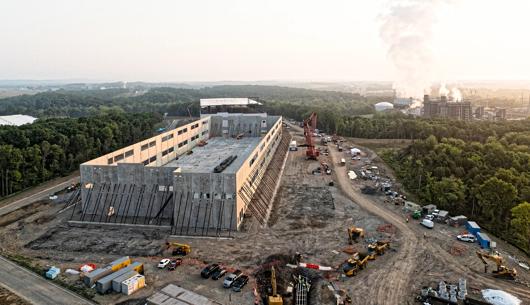380+ C-suite leaders from £100m+ businesses across the manufacturing, real estate and construction, retail and supply chain, technology, and energy and infrastructure sectors share their optimistic outlook for M&A inward investment deals in the coming year.
In today's world, technology companies are embedded in almost every aspect of our daily lives.
A strong digital foundation is essential for all businesses and purchasing or licensing technologies for automation, new payment methods (such as digital currency), better and faster e-commerce and revolutionising compliance has become the norm. However, 2025 has also brought fresh complexity.
Supply chain resilience is now a strategic consideration in M&A, not just a procurement issue. Investors are looking carefully at where and how key technologies are developed, and whether value chains can withstand geopolitical pressure.
In February 2025, we asked technology corporates in the UK and Ireland their views on M&A inward investment in 2025. The results showed a significant confidence for deals tempered by a sense that international regulations would continue to provide a significant challenge.
M&A outlook and sector confidence
A majority (59%) of respondents expect that the volume of inward M&A deals will increase in the sector in the next 12 months. 39% anticipate a significant increase driven by renewed market confidence and sector growth - outstripping every other sector we surveyed by a factor of two.
Confidence in their sector was clear from our results, 51% of technology corporates stated that their sector would see the highest level of inward investment when compared with other sectors (only food and drink retailers had similar levels of self-belief). Technological innovation and digital transformation are unsurprisingly the leading factors driving investment, cited by 44% of technology corporates. Technology respondents are also confident about the growing role of private equity (PE) in M&A, with 86% anticipating increased PE involvement.
Political landscape and government influence
Markedly, this confidence extended to the political landscape, particularly in relation to the UK Government, tax regulations and government incentives. 61% of respondents reported increased confidence in inward investment under the new government, with 33% agreeing confidence levels had significantly increased (more than any other sector). 52% of respondents reported that changing regulations would attract investment and have a positive impact on inward M&A.
Further, a huge majority (89%) of technology respondents expect that government incentives will play a role in shaping inbound investment patterns, with 47% anticipating that their role will be significant as tax breaks and grants make the UK and Ireland attractive to investors.
Actions taken by the UK Government in recent months, particularly the publication of the Artificial Intelligence (AI) Opportunities Action Plan - a "blueprint to turbocharge AI" - is likely to have had an impact as has Prime Minister Keir Starmer's broader commitment to embracing digital methods and AI to improve efficiency across government and public services.
AI and technological innovation
Undoubtedly, even under the current trade circumstances, one of the biggest areas for investment in 2025 will be AI. It therefore comes as no surprise that close to a third (30%) of all respondents, when asked which sectors they expect to see the highest level of inward investment over the next 12 months in, answered the technology sector.
One respondent asserts that "AI is a game changer" and respondents broadly agreed that AI is fundamentally reshaping deal-making strategies, positioning it as a primary driver of M&A growth. Overwhelmingly, businesses are increasingly seeing investment in AI not only as a competitive advantage but as a necessity for survival. It is important to put AI firmly within the context of the wider drivers of digital transformation across all businesses. As one respondent noted, alongside AI, M&A deals are focusing on cloud infrastructure and digital capabilities which are essential to ensuring business do not fall behind.
The emphasis on AI, cloud infrastructure, and cybersecurity reflects the role of technology corporates as critical enablers for growth across other industries as companies continue to embrace digital platforms. The influence of digital transformation and AI on inward M&A activity is widely recognised across all sectors, with 77% of respondents expecting it to shape their sector in the next 3-5 years. Unsurprisingly, technology corporates are the most optimistic about this with 89% believing it will drive increased deal activity, while the remaining 11% foresee no change. Notably, none of the respondents expect a decline.
Investment focus and ESG considerations
Unlike other sectors, technology corporates expect the majority of investment into the sector to focus on London, with 48% of respondents pointing to the capital as the preferred destination. London's concentration of tech talent, infrastructure, and venture capital continues to make it an attractive hub for both domestic and international investors.
The technology sector leads the other sectors surveyed on Environmental, Social and Governance (ESG) concerns with 55% viewing ESG as a significant factor in M&A decisions, stating that investors are prioritising sustainable and ethical businesses. To this end, a greater proportion of technology corporates than other sector (28%) said that embedding ESG strategies into targets was key to attracting investment.
Challenges and regulatory landscape
As to challenges in the sector, technology corporates were understandably alive to the significant impact geopolitics could have on their sector. The fierce competition between nation states to come up with better and cheaper technologies has led to significant tensions. The recent emergence of DeepSeek, an AI powered app from China has drawn criticism from the US administration and from US firm OpenAI which alleges DeepSeek used data belonging to them to train its models. In March 2025 the firm called for the US Government to ban models from China to prevent privacy and security risks.
Our survey found 49% of technology respondents thought that economic instability and inflation fluctuations could lead to increased caution among inward investors, resulting in fewer deals, while 42% cited technological disruption or cybersecurity as a major regulatory challenge for inward M&A in their sector.
The introduction of the EU AI Act further complicates cross-border M&A, particularly for technology firms, as businesses must ensure compliance with evolving standards while managing privacy laws that differ between the UK and EU. Diverging regulatory frameworks, especially around data privacy and AI, are increasingly seen as a cost and complexity driver in M&A deals.
The UK's Data (Use and Access) Bill (passed both Houses of Parliament on 11 June 2025) aims to simplify compliance and diverge from EU GDPR, has been met with mixed reactions. While some sectors welcome the potential flexibility, others warn that regulatory fragmentation could deter investment, especially from US-based companies. In contrast, Ireland's stringent enforcement of GDPR – including record fines against major tech firms – signals a robust regulatory posture that investors must navigate carefully.
Expert commentary
Anthony Nagle, partner and Head of Technology at Browne Jacobson, comments:
"I am encouraged by the findings from our technology sector respondents. Tech corporates are showing strong confidence, with 61% of technology corporates anticipating increased inward M&A activity, it's clear that the appetite for growth and innovation remains strong, despite the complex global backdrop.
"Looking ahead, acquisitions in this space will continue to be driven by demand for AI, IoT and digital infrastructure. Successful dealmaking increasingly hinges on the ability to anticipate regulatory and trade friction and to structure transactions in ways that build long-term resilience as well as short-term value."
Contents
- Investing in the UK and Ireland
- Inward investment in the UK and Ireland in 2025: Sector focus
- 1. Manufacturing and industrials: Steady optimism for food and drink M&A in 2025
- 2. Real estate and construction: Cautious optimism for M&A in 2025
- 3. Retail and supply chain: Fashion and beauty retailers eye technology to drive M&A in 2025
- 5. Energy and infrastructure: Muted confidence for M&A in 2025
- Conclusion: Inward investment in the UK and Ireland: Sector focus in 2025
Expert commentary

Anthony Nagle
Partner
Anthony is head of the firm’s digital and sourcing team in the UK and Ireland and is recognised as a leading expert on digital services and sourcing contracts.
Anthony.Nagle@brownejacobson.com
+44 (0)20 7871 8501
Contact

Gavin Cummings
Partner
gavin.cummings@brownejacobson.com
+44 (0)115 976 6157










































